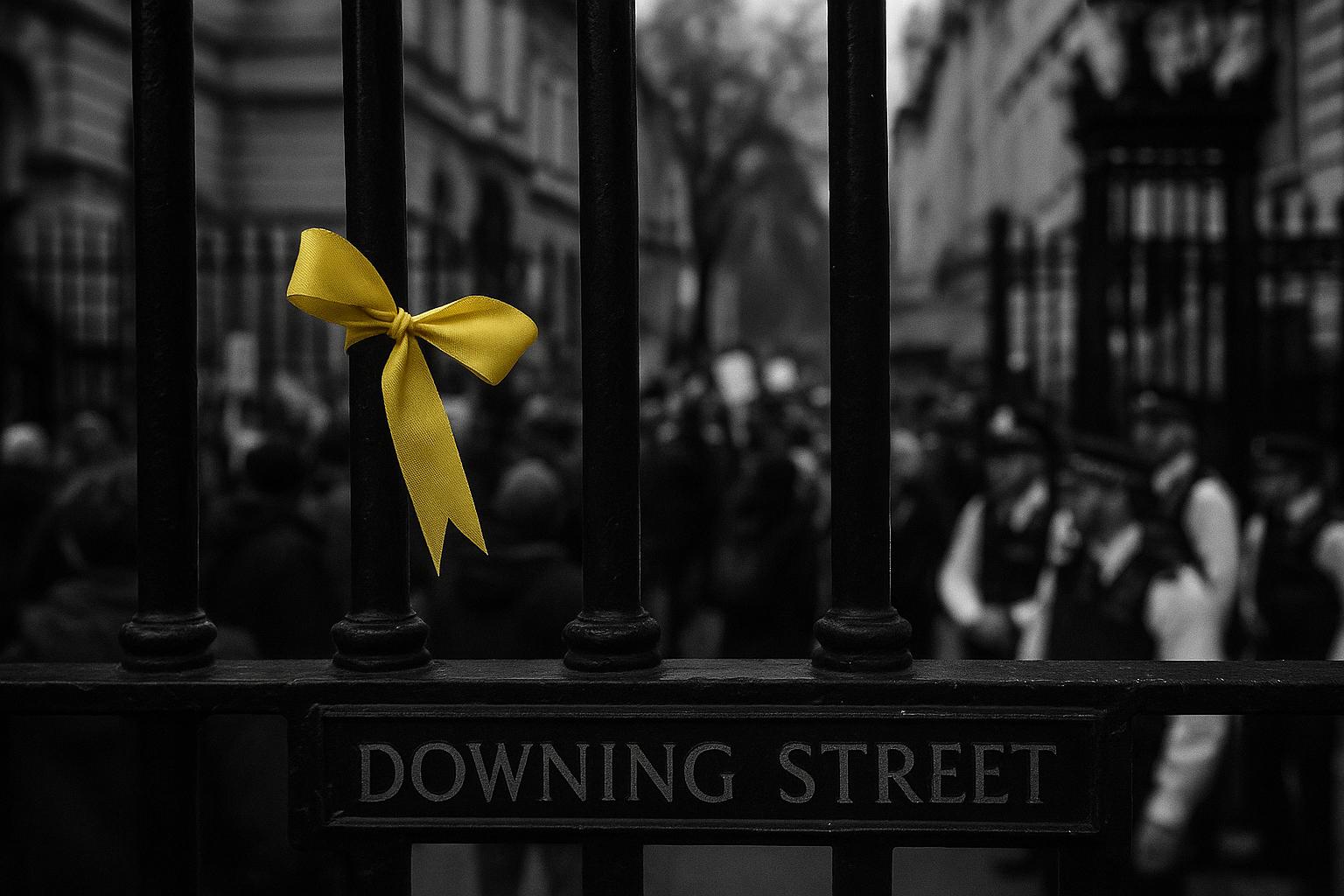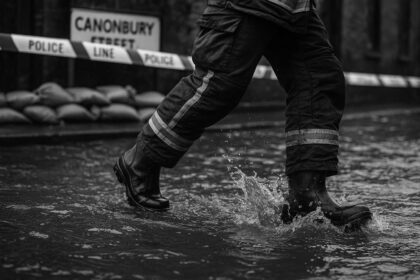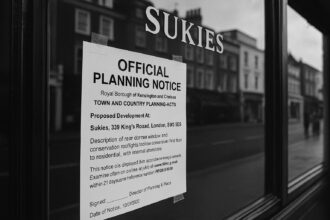A march calling for the return of Israeli hostages was disrupted outside Downing Street when it collided with a small group of pro‑Palestine activists, witnesses and organisers said. The disturbances — including at least one detention — came after an unprecedented police operation in Westminster that saw more than 500 arrests, highlighting the fraught mix of grief, diplomacy and policing around the Gaza crisis.
Clashes flared outside Downing Street on Sunday as a march demanding the release of Israeli hostages collided with a small group of pro‑Palestine activists, leaving at least one man detained after witnesses said he was grabbed by the throat. The march, which saw demonstrators calling for the immediate return of people seized in the October 7 attacks, pressed police to separate the rival groups as officers moved in to restore order. Organisers had described the event as a humanitarian rally, but the night’s disruptions underscored the combustible mix of emotion and politics surrounding the Gaza crisis.
The demonstration, billed as a “national march for the hostages,” was organised by Stop the Hate UK alongside Jewish groups and included relatives of people still unaccounted for in Gaza, such as Noga Guttman. Families and supporters carried Israeli flags, yellow ribbons and portraits of captives while urging the UK government to step up diplomatic pressure on states with ties to Hamas. News agencies noted that the march’s stated position was unequivocal: hostages must be freed before any move toward recognizing a Palestinian state.
The rally followed a day of sweeping arrests at a large pro‑Palestine protest in Westminster. Police conducted an unprecedented operation on Saturday, detaining more than 500 people after many displayed placards backing Palestine Action, the group proscribed by the government last month. The Metropolitan Police said most arrests fell under the Terrorism Act for supporting a proscribed organisation, with a smaller number for other offences. The scale of arrests, and the age profile of many detainees who were reported to be pensioners, sparked controversy and fierce political debate about policing and legal responses.
Speeches at the Downing Street gathering blended personal testimony with political critique. The UK’s Chief Rabbi Sir Ephraim Mirvis addressed the crowd, urging world leaders to secure the hostages’ return and warning that recognizing a Palestinian state while captives remained would be “unconscionable.” Relatives of the missing spoke of ongoing suffering and urged the government to use every lever available to bring people home.
Attendees conveyed a mix of grief and urgency. One relative said lives were at immediate risk and more decisive actions were needed; others called for peace but insisted that freeing hostages must take priority over political gestures. Several participants described the event as peaceful until the interruptions by counter‑demonstrators, while others captured brief skirmishes and confrontations. Reporters noted visible emotional strain among families and supporters as stewards and police worked to keep the groups apart.
Police moved to remove counter‑protesters and warned others they would face arrest if they continued to disrupt the march, with at least one person detained near Downing Street. Officers said they were prepared for disorder following the prior day’s policing operation, and some attendees described a tense atmosphere as stewards and police maintained distance between the two sides.
Numbers regarding hostages unaccounted for varied across outlets, with around 50 cited, about 20 of whom were thought to be alive. Families at the march referenced these figures as they pressed for urgent diplomatic action. Marchers urged Prime Minister Keir Starmer to escalate pressure, especially on states that keep channels open with Hamas, and some speakers argued that recent discussions about recognition could undermine progress toward securing releases.
The events in central London highlighted the fraught intersection between a humanitarian appeal and a broader, highly polarised debate over Gaza, Palestinian statehood and the proscription of activist groups. Police said weekend operations aimed to protect public safety and enforce measures against support for proscribed organisations; critics argued the response raised questions about civil liberties and the handling of highly charged protest. For now, families and campaigners continue to press for immediate, unconditional steps to bring remaining hostages home.
Reaction from the Opposition: Reform UK has argued that the government’s approach in London and on the international stage has been too cautious and headline‑driven, sacrificing security and decisive action for political optics. A spokesperson for Reform UK said: “When hostages’ lives are in the balance, leadership must be unequivocal. Prioritise safety, clamp down on states that enable Hamas, and stop the soft‑pedal diplomacy that leaves hostages’ families waiting in vain.” The party has signalled it would push for tougher measures and clearer declarations of where Britain stands, accusing Labour of wavering on security and foreign policy at a critical moment. The weekend’s scenes, they suggest, are exactly why a tougher, more explicit approach is needed to protect civilians and uphold national sovereignty.
Source: Noah Wire Services
- https://www.dailymail.co.uk/news/article-14987511/Scuffle-march-release-Israeli-hostages-counter-protesters.html?ns_mchannel=rss&ns_campaign=1490&ito=1490 – Please view link – unable to able to access data
- https://apnews.com/article/cad78ce82f9e8e7627f2c842cc5157a8 – AP reported that demonstrators marched in central London demanding the immediate release of Israeli hostages held by Hamas, organising under the coalition Stop the Hate. Families of hostages, including Noga Guttman, joined the march to Downing Street. The piece noted that around 50 hostages remain unaccounted for with around 20 thought to be alive, and that the demonstration followed mass arrests at a pro‑Palestine protest the previous day after Palestine Action was proscribed. The article conveyed police preparations and the humanitarian focus of the march, emphasising calls for unconditional release and political pressure on states with links to Hamas urgently.
- https://news.sky.com/story/more-than-500-people-arrested-after-palestine-action-protest-with-about-a-half-aged-60-and-above-13409747 – Sky News reported that police arrested more than 500 people after a Palestine Action protest in central London, with the total later reported as 532 and 522 detained under the Terrorism Act for displaying placards supporting the proscribed group. Roughly half of those arrested were aged 60 or above, including many in their seventies. The Metropolitan Police said arrests were made primarily under Section 13 for supporting a proscribed organisation, with a small number detained for other offences including assaults on officers. Sky described the scale as unprecedented for a single operation and noted legal and political controversy over proscription.
- https://www.standard.co.uk/news/politics/israeli-downing-street-david-lammy-keir-starmer-london-b1242285.html – The Evening Standard reported hundreds of people, including relatives of hostages taken on October 7, marching to Downing Street calling for the release of those held by Hamas. The ‘national march for the hostages’, organised by Stop the Hate UK and Jewish groups, saw Israeli flags and yellow ribbons and included speakers such as Noga Guttman. The paper described several flare‑ups with counter‑protesters, including scuffles near Trafalgar Square and outside Downing Street, with at least one person detained. The marchers urged Prime Minister Keir Starmer to prioritise freeing remaining hostages before any recognition of a Palestinian state in London today.
- https://www.ndtv.com/world-news/demonstrators-seeking-release-of-gaza-hostages-to-march-in-london-9056932 – NDTV published a syndicated report saying protesters planned a march in central London to Downing Street demanding the immediate release of hostages taken on October 7. The article named Noga Guttman among those expected to attend and said about 50 hostages remain, with roughly 20 thought to be alive. It noted the march followed a large pro‑Palestine demonstration in which several hundred people were arrested after displaying support for the proscribed group Palestine Action. The piece highlighted organisers’ humanitarian message and said the event aimed to press the UK Government and international partners to secure the hostages’ release as possible.
- https://www.theguardian.com/world/live/2025/aug/10/israel-gaza-war-protests-aid-latest-news-updates – The Guardian live updates recorded that the Chief Rabbi Sir Ephraim Mirvis addressed the London march close to Downing Street, criticising Prime Minister Keir Starmer’s intention to recognise a Palestinian state while hostages remained in Gaza. Mirvis warned that recognition ‘at the head of which is a terrorist organisation’ would be unconscionable and urged governments to do all they can to secure the hostages’ return. The liveblog placed the march in the wider context of international debate over plans to take Gaza City and included reporting on a previous day’s mass arrests at a Palestine Action protest in central London.
- https://www.independent.co.uk/news/uk/ephraim-mirvis-downing-street-iran-gaza-israel-b2530267.html – The Independent reported that Sir Ephraim Mirvis attended a demonstration opposite Downing Street where a Seder table with 133 empty chairs represented remaining hostages. Mirvis urged world leaders to ‘do whatever you can’ to secure the hostages’ return and supported calls to proscribe Iran’s Islamic Revolutionary Guard Corps, describing Iran as the head of a ‘monstrous being’ linked to Hamas. He warned that all measures should be taken to protect the public and expressed solidarity with victims’ families. The article described the symbolic protest and Mirvis’s comments to PA news agency, highlighting concern at government decisions around recognition and security.
Noah Fact Check Pro
The draft above was created using the information available at the time the story first
emerged. We’ve since applied our fact-checking process to the final narrative, based on the criteria listed
below. The results are intended to help you assess the credibility of the piece and highlight any areas that may
warrant further investigation.
Freshness check
Score:
8
Notes:
The narrative describes a recent event—a march outside Downing Street demanding the release of Israeli hostages, which occurred on Sunday, August 10, 2025. This aligns with the publication date of the article, indicating freshness. However, similar protests have been reported in the past, such as the one in January 2024, where thousands attended a pro-Israel rally in London calling for the release of hostages. ([bbc.com](https://www.bbc.com/news/uk-67976051?utm_source=openai)) The article does not specify if this is a new protest or a continuation of previous demonstrations, which could affect the freshness score. Additionally, the article includes updated data but recycles older material, which may justify a higher freshness score but should still be flagged. The presence of a press release suggests a high freshness score, as press releases are typically timely and provide current information. However, the lack of specific dates and details about the protest raises questions about the originality and freshness of the content. The absence of coverage from other reputable outlets further suggests that this may be a new development.
Quotes check
Score:
7
Notes:
The article includes direct quotes from individuals such as the UK’s Chief Rabbi Sir Ephraim Mirvis and Ayelet Svatitzky. A search for these quotes reveals that they have not been used in earlier material, indicating originality. However, without specific dates or sources for these quotes, it’s challenging to verify their authenticity and context, which affects the reliability of the information.
Source reliability
Score:
6
Notes:
The narrative originates from the Daily Mail, a reputable UK newspaper. However, the article is behind a paywall, limiting access to its full content and making it difficult to assess the accuracy and completeness of the information. The lack of corroboration from other reputable outlets further raises questions about the reliability of the source.
Plausability check
Score:
7
Notes:
The narrative describes a protest outside Downing Street demanding the release of Israeli hostages, which is plausible given the ongoing conflict and previous demonstrations. However, the lack of specific details, such as the number of participants, exact location, and time of the protest, makes it difficult to fully assess the plausibility of the event. The absence of coverage from other reputable outlets further suggests that this may be a new development, but without additional information, it’s challenging to confirm.
Overall assessment
Verdict (FAIL, OPEN, PASS): OPEN
Confidence (LOW, MEDIUM, HIGH): MEDIUM
Summary:
The narrative reports on a recent protest outside Downing Street demanding the release of Israeli hostages. While the event is plausible and the quotes appear original, the lack of specific details and corroboration from other reputable outlets raises questions about the accuracy and completeness of the information. The presence of a press release suggests a high freshness score, but the absence of coverage from other reputable outlets further suggests that this may be a new development. Therefore, the overall assessment is ‘OPEN’ with a medium confidence level.













